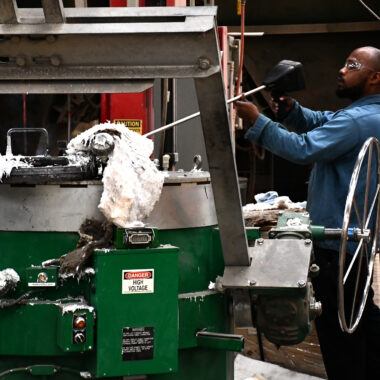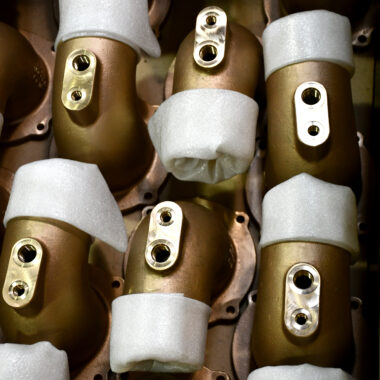Accomplish Perfection: Advanced Techniques in Casting Aluminum
Accomplish Perfection: Advanced Techniques in Casting Aluminum
Blog Article
The Definitive Handbook on Aluminum Spreading Services
Within the intricate globe of aluminum spreading solutions exists a wealth of expertise waiting to be checked out. As industries proceed to demand precision and high quality, comprehending the nuances of aluminum spreading procedures comes to be paramount. From the vital tools and tools to the crucial aspect of quality control, every information plays a substantial function fit the final outcome. Nevertheless, what genuinely establishes a detailed manual apart is its capability to not only provide fundamental knowledge but additionally to supply understandings right into making best use of performance and productivity. As we browse via this definitive handbook, discovering industry trends and developments that form the landscape of light weight aluminum casting solutions, we are reminded of the endless opportunities that await those happy to immerse themselves in this detailed craft.

Comprehending Light Weight Aluminum Casting Procedures
Exploring the intricacies of aluminum spreading processes reveals the accuracy and intricacy included in changing liquified steel into complex components. Aluminum spreading is a meticulous manufacturing method that involves the pouring of liquified light weight aluminum right into a mold to develop a wanted form.
During the cooling process, the aluminum strengthens and takes the form of the mold and mildew. What follows is precise workmanship to eliminate any type of flaws and improve the part to satisfy the called for specs. This process requires a keen eye for information and a deep understanding of metallurgy to ensure the end product's quality and integrity.
Recognizing the subtleties of aluminum spreading procedures is vital for creating top notch parts that meet sector criteria and demands. From aerospace to vehicle markets, the accuracy of aluminum spreading plays an essential role in manufacturing trustworthy and resilient parts.
Crucial Devices and Tools
What devices and equipment are crucial for achieving precision and efficiency in aluminum casting procedures? To make certain successful aluminum spreading, several essential tools and equipment are required. Crucible heating systems play a crucial role in thawing the aluminum alloys, providing the molten metal needed for spreading. Crucibles made from materials like clay graphite or silicon carbide are frequently utilized because of their high warmth resistance. In addition, a ladle is essential for transferring the liquified metal from the furnace to the molds precisely. Ventilation systems are critical to eliminate any type of fumes or gases created throughout the casting procedure, making certain a risk-free functioning environment. Molds, made from products such as sand or steel, are necessary to form the liquified metal into the wanted form. Other tools like tongs, pouring containers, and cooling down chambers are likewise important for taking care of the molten metal and making certain appropriate solidification. By making use of these tools and devices effectively, light weight aluminum casting solutions can accomplish high accuracy and performance in their procedures.
Quality Assurance in Aluminum Casting
Guaranteeing consistent top quality criteria is critical in light weight aluminum spreading procedures to meet industry demands and client expectations. Quality assurance in light weight aluminum casting includes an organized method to surveillance and examining every phase of the spreading process to assure the final item's integrity. To anchor attain this, numerous methods are utilized, such as visual inspections, dimensional checks, non-destructive testing, and product evaluation. Aesthetic assessments are conducted to recognize surface defects like fractures, porosity, or incomplete fills up. Dimensional checks guarantee that the casting fulfills exact specs. Non-destructive screening methods like X-ray, ultrasonic, or color penetrant assessments can find internal imperfections without damaging the component. Material analysis via spectroscopy or chemical screening validates the make-up of the aluminum alloy utilized (casting aluminum). By applying strict quality assurance measures, aluminum casting provider can supply parts that comply with the highest possible criteria of dependability, efficiency, and high quality, inevitably pleasing both market guidelines and consumer demands.

Making The Most Of Performance and Productivity
To improve operational performance in look at this site aluminum spreading services, maximizing performance and productivity is crucial for meeting production needs and keeping affordable benefit in the market. Executing lean production principles, such as decreasing waste and improving procedures, can considerably improve overall performance. Utilizing advanced technology, like computer-aided design (CAD) software program and automated systems, can improve productivity by decreasing manual work and boosting precision.

Working together very closely with providers to ensure a stable circulation of top notch materials and implementing robust organizing and inventory monitoring systems are additionally crucial methods for making the most of effectiveness in light weight aluminum spreading services. By concentrating on these areas, companies can achieve greater levels of productivity, satisfy customer needs properly, and stay in advance in a competitive market.
Market Fads and Innovations
In response to the progressing landscape of aluminum spreading solutions, staying abreast of sector fads and advancements is necessary for keeping an one-upmanship and fulfilling the vibrant needs of the marketplace. One remarkable trend in the aluminum spreading sector is the enhancing emphasis on sustainability and ecological responsibility. Companies are embracing greener practices, such as making use of recycled aluminum and applying energy-efficient processes, to straighten with customer assumptions and governing requirements.
Additionally, improvements look at these guys in innovation are revolutionizing light weight aluminum spreading processes. The integration of automation, robotics, and expert system is improving manufacturing, enhancing accuracy, and minimizing preparations. 3D printing is additionally making waves in the industry by making it possible for intricate geometries to be generated with better performance and cost-effectiveness.
Furthermore, there is a growing emphasis on personalization and item personalization. With consumers looking for one-of-a-kind and customized items, aluminum casting services are adjusting to offer more flexible manufacturing options. By accepting these industry trends and developments, business can place themselves for success in a rapidly developing market.
Final Thought
In final thought, the handbook on light weight aluminum spreading services supplies a detailed overview of the processes, tools, quality assurance measures, effectiveness methods, and sector fads in the area. By recognizing these crucial facets, companies can enhance their casting processes, ensure top notch items, and remain affordable out there. This conclusive handbook functions as a valuable source for those included in aluminum casting solutions.
As markets proceed to require precision and top quality, comprehending the subtleties of aluminum casting processes comes to be paramount (casting aluminum). Aluminum casting is a thorough production method that entails the putting of liquified light weight aluminum into a mold and mildew to create a desired shape.Making certain constant top quality standards is vital in light weight aluminum spreading processes to satisfy market requirements and consumer assumptions. Quality control in aluminum casting involves a methodical strategy to tracking and evaluating every stage of the casting process to ensure the last product's honesty.In conclusion, the manual on light weight aluminum casting services provides a detailed introduction of the processes, devices, quality control measures, performance approaches, and industry trends in the area
Report this page